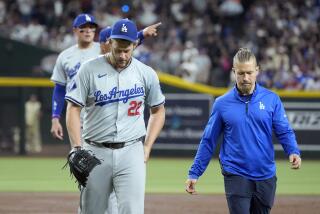Two Can Play This Game
VERO BEACH, Fla. — Izzy idolized Gio even before they met, drawn to the framed photos of the sturdy pitcher wearing the red and white uniform of the storied Lara Cardinales.
“That’s your son?” Izzy said to Gio’s mother incredulously. She nodded, swelling with pride, and Izzy knew he had lucked into something special.
Izzy was the nickname of Cesar Izturis, a skinny eighth-grade fielding whiz who was playing for a Venezuelan youth all-star team in a city far from his hometown. Gio was what everyone called Giovanni Carrara, an established star for a popular team in his native country who also was climbing through the Toronto Blue Jay farm system.
Players on the 14-year-old team were paired with host families during the two-week tournament, and Izturis was taken in by the Carraras. Giovanni was away playing baseball, but his parents and four siblings quickly grew fond of the polite, respectful shortstop with the slight build and infectious grin.
Two years later, Izzy and Gio finally crossed paths.
Izturis was a rocket, hurtling into the baseball stratosphere. At 16, he became the Cardinales’ shortstop, and major league scouts clamored for his signature on a contract.
Carrara was a rock, a local legend who by then had made his major league debut and seemed to save his best pitching for the Venezuelan winter league.
Said Carrara: “Izzy played like a veteran from the first day. It was unbelievable. He had big-time confidence.”
Said Izturis: “I was young and Gio made me feel comfortable. His mom came up to me after the first game and gave me a hug. He was like a big brother.”
Nine years later, Izturis, 25, and Carrara, 37, are Dodger teammates. Despite the age difference, their link has only strengthened. They are comrades, confidants and countrymen who live near each other in Los Angeles during the season and in Venezuela during the winter.
Izturis is a Gold Glove shortstop and pesky switch-hitting leadoff batter who, in only his fourth season with L.A., astoundingly is the senior Dodger position player.
Carrara is a reliable reliever with a 17-6 record and 2.98 earned-run average in 152 Dodger appearances, a clubhouse statesman and settling influence on young Latino players.
Both are married with young children. Izturis’ 5-year-old son, Cesar Daniel, will start T-ball this year. Carrara has twin sons who are nearly 2. Often, the two families go to dinner together.
“Izzy had to do everything for his family, and that’s what makes him so mature,” Carrara said. “Family is No. 1 for him.”
They fret about the dangerous conditions in their homeland, the kidnapping of the mother of Venezuelan pitcher Ugueth Urbina and precautions they must take. Urbina’s mother, Maura Villarreal, was rescued recently from kidnappers who had held her captive for nearly six months.
The number of kidnappings in Venezuela has risen from about 50 in 1995 to more than 200 last year. Baseball players are known to have money, making family members attractive targets.
Izturis signed a three-year, $9.9-million contract with the Dodgers during the off-season, a deal that gives him security and enables him to avoid arbitration the next two years. Yet with wealth comes worries.
“You have to be careful, change your routine,” Izturis said. “I tell my wife every night, be careful. Don’t go far from home. Venezuela is beautiful. It’s a tremendous country, so this isn’t easy. You want to go to restaurants, and you can’t go alone with your family.”
Carrara just puts it out of his mind.
“Everybody is concerned, but the more you think about it, that’s when it’s going to happen,” he said.
Positive thinking has kept Carrara pitching. His road to the Dodgers was full of bumps. He bounced from the Blue Jays to the Cincinnati Reds to the Seibu Lions of the Japanese League to the Colorado Rockies, shuttling between the majors and triple-A at every stop.
His break came when the Dodgers signed him to a minor-league deal before the 2001 season and promoted him from triple-A Las Vegas in May. This time he stuck, posting a 6-1 record and 3.16 ERA in 47 appearances.
Izturis made his debut the same year with the Blue Jays, who had signed him at 16. His fielding was sensational, but he had trouble getting on base, especially from the left side of the plate. In December, the Blue Jays traded him to the Dodgers with reliever Paul Quantrill for pitchers Luke Prokopec and Chad Ricketts, neither of whom had success with Toronto.
The first player Izturis saw when he reported to Dodger spring training in 2002?
“It was Gio,” he said. “He said, ‘This is going to be good for you.’ He really helped me relax.”
Carrara told the other pitchers the young shortstop would help all of them with his glove.
“I said, ‘Wait until you see him. He’s going to be big time,’ ” he said.
Izturis blossomed last season, batting .288 with 193 hits, 32 doubles, 90 runs and 25 stolen bases.
His on-base percentage of .330 was not exceptional for a leadoff batter, but it was the best of his career by nearly 50 points.
Defensively, he was nothing short of amazing. Izturis made 10 errors, nine on throws. The other was a line drive that skipped off his glove during a game at San Francisco.
In other words, he didn’t boot a groundball all season.
“He’s unbelievable,” Carrara said. “When you see a guy who plays a whole season and doesn’t make an error, when you hear a shortstop with the reputation of Omar Vizquel say that Izzy is going to be better and better, you know that this guy is something special.”
There is little doubt Izturis will be playing long after Carrara retires. As good as he might become, he’ll never forget his friend. Their bond goes beyond baseball.
Carrara’s father died in 1995 -- one year after Izturis stayed with the family -- and his mother died in November after a long illness. Izturis, who is very close to his own parents, did what he could to help Carrara deal with his grief.
It was a bit of a role reversal -- normally it is Gio counseling Izzy -- and Carrara appreciated the effort.
“He does anything for his mom and dad,” Carrara said. “He’s one of those kids who doesn’t forget where he comes from. He’ll always be the same guy, and I think that is very important.
“That’s why I like him and why I’d always take care of him, no matter what.”
More to Read
Go beyond the scoreboard
Get the latest on L.A.'s teams in the daily Sports Report newsletter.
You may occasionally receive promotional content from the Los Angeles Times.











